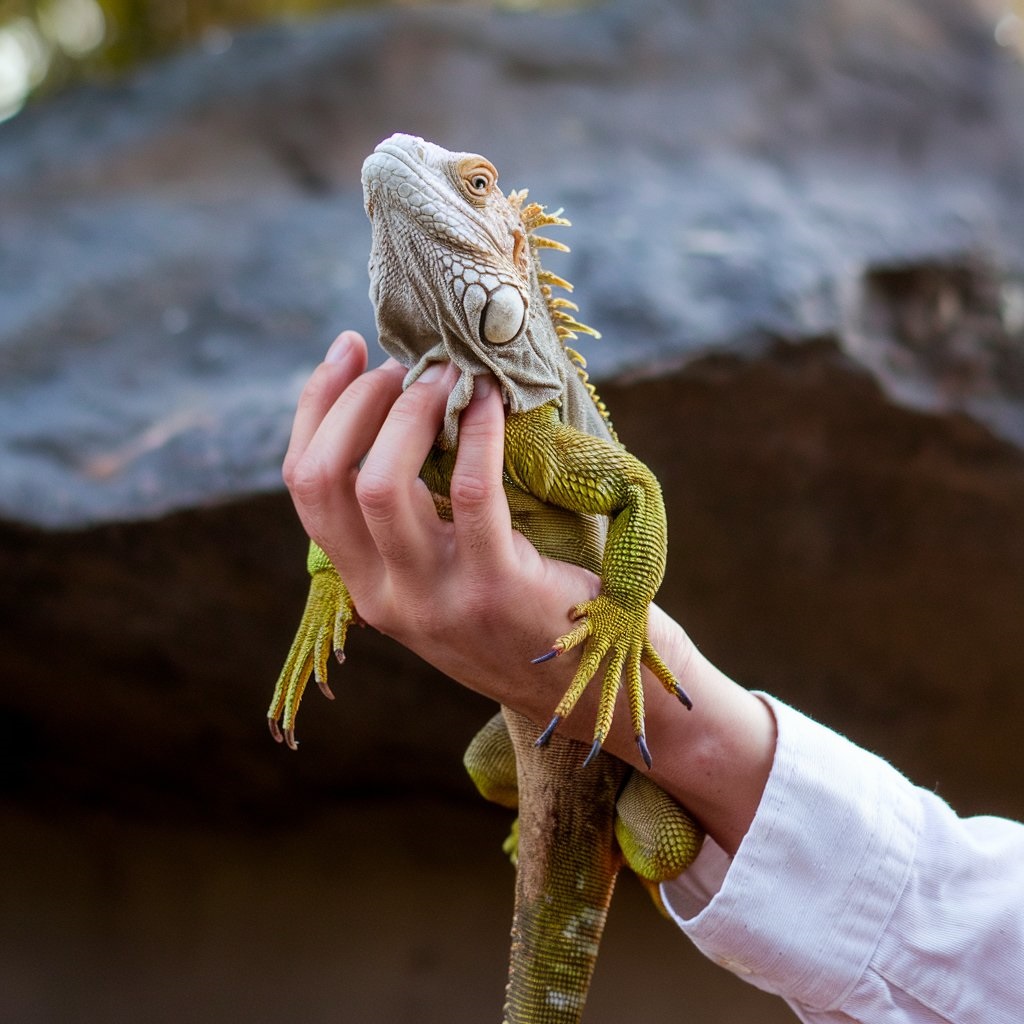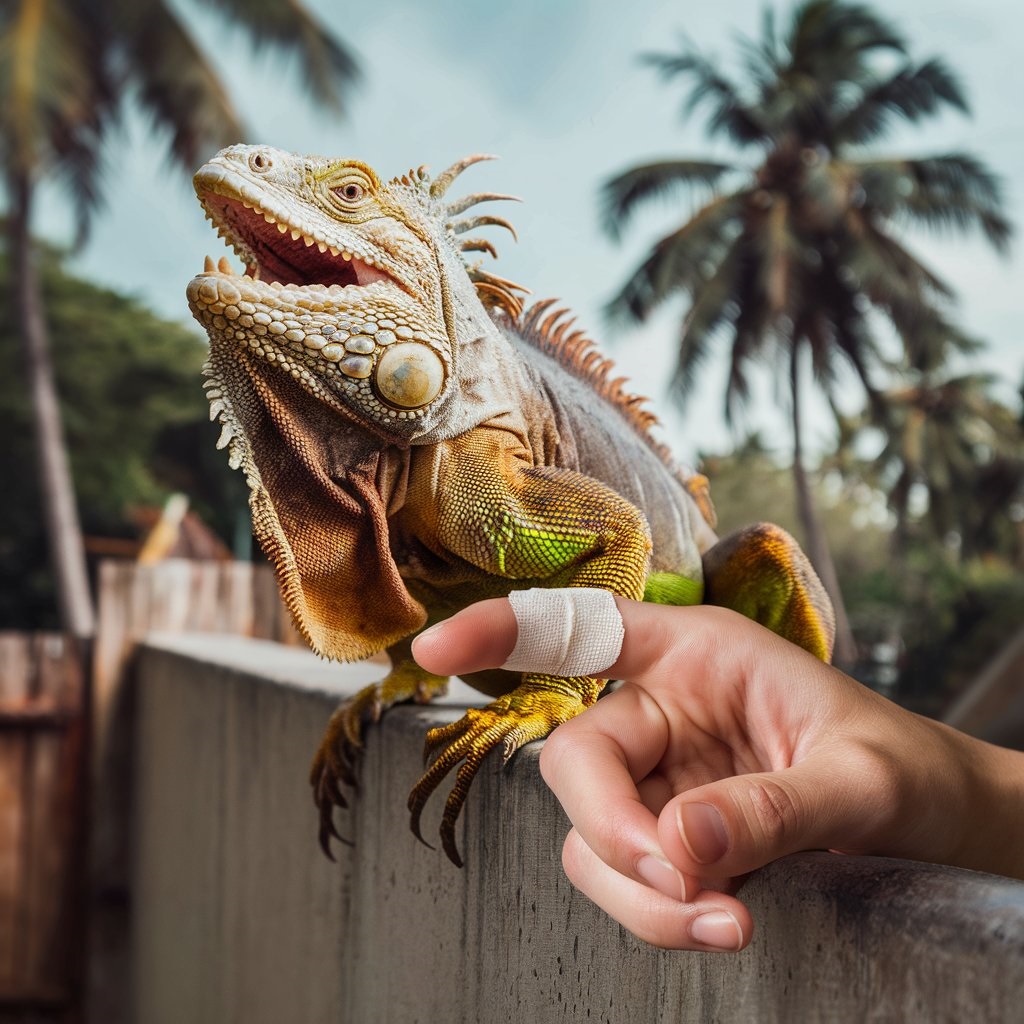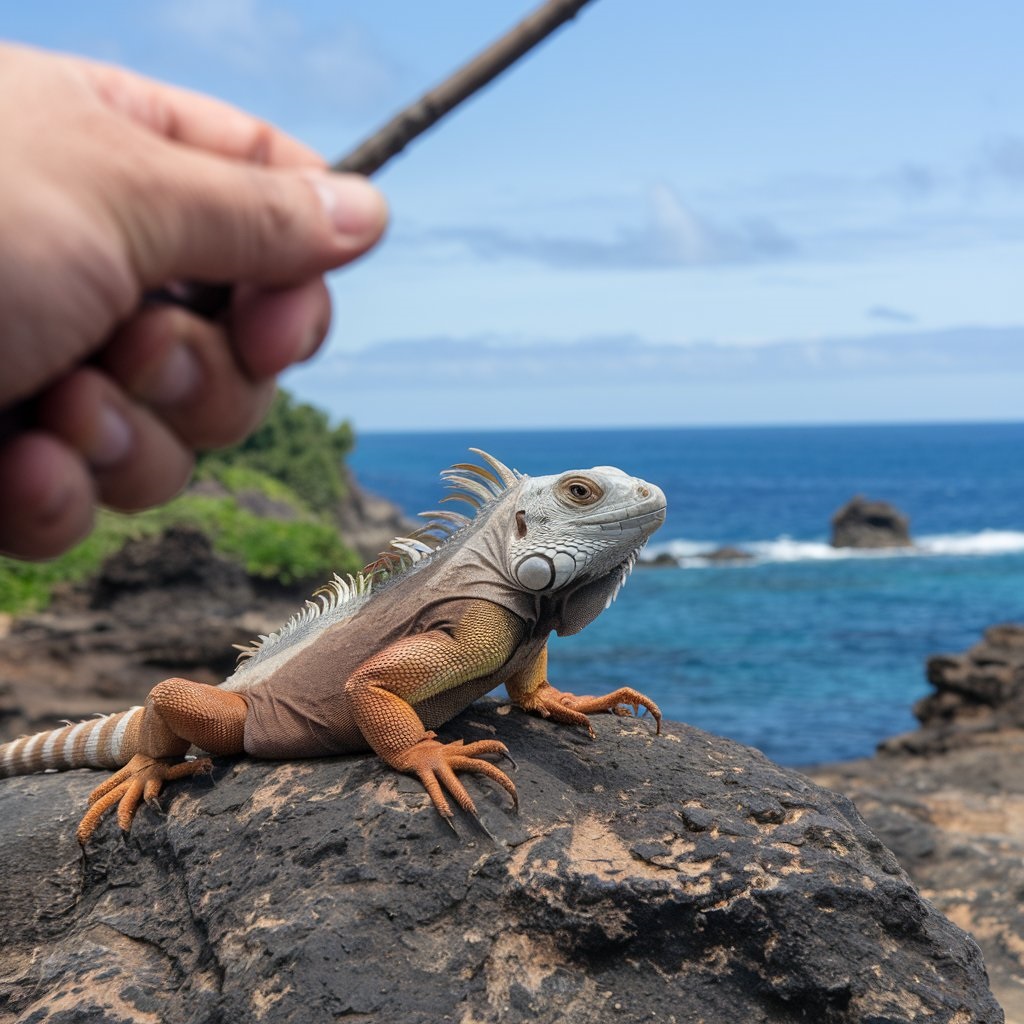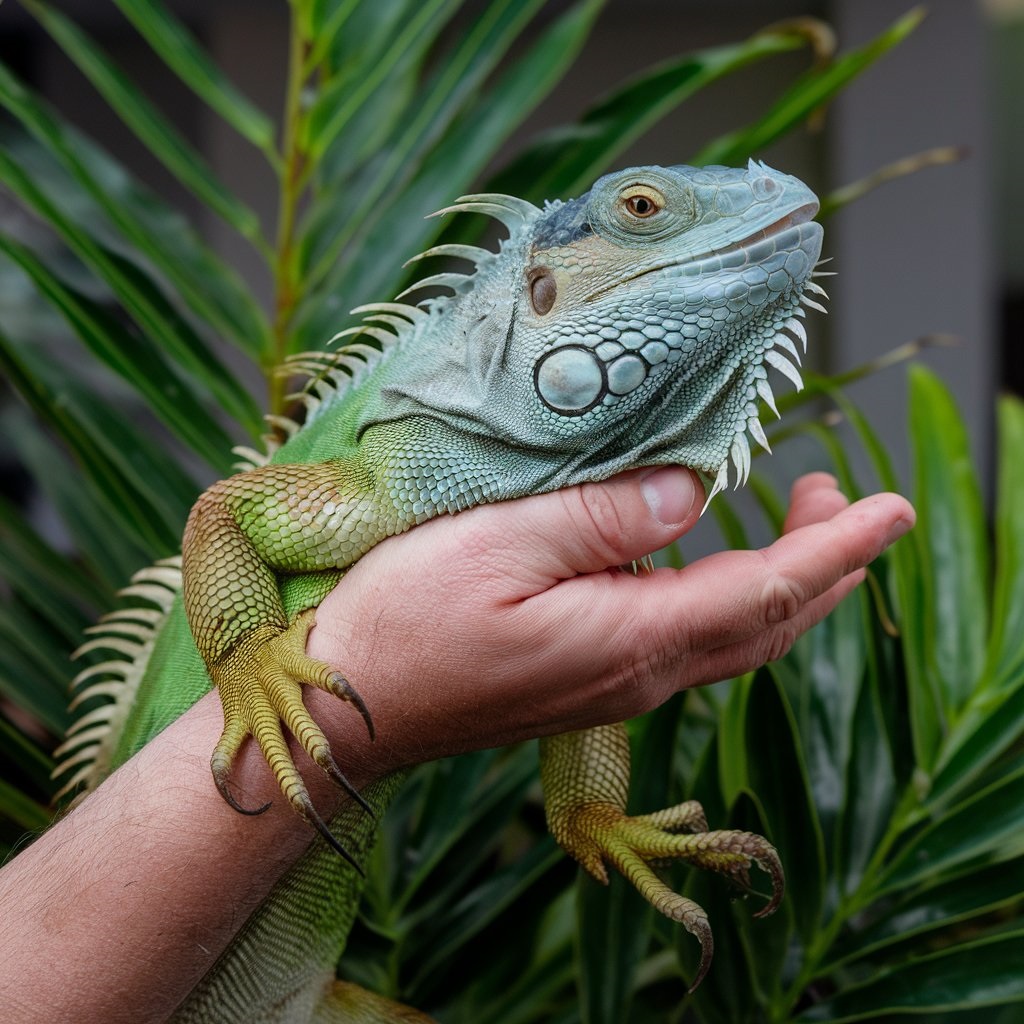Iguanas, with their majestic size, long tails, and distinctive green color, have fascinated many animal lovers and reptile enthusiasts. These herbivorous lizards are commonly found across Central America, South America, the Caribbean, and even the Galápagos Islands. Despite their unique charm and relatively calm nature, a common question that arises is: Do iguanas attack humans?
In this blog post, we will explore the myths and realities behind iguana aggression, defensive behaviors, and human interactions. By breaking down their biology, aggressive triggers, and safety tips, we will clear up any misconceptions and provide a thorough understanding of these reptiles.
Here’s a table summarizing the key facts and figures from the article:
| Fact | Details |
|---|---|
| Iguana Size | Can grow up to 10 feet (3 meters) in length, depending on species (e.g., Green Iguana). |
| Iguana Lifespan | Typically 15-20 years in the wild; up to 25 years in captivity with proper care. |
| Mating Season | Iguanas become more territorial and aggressive during the mating season. |
| Tail Length | Can be over 3 feet (90 cm), used for balance, defense, and communication. |
| Bite Strength | Serrated teeth that can cause painful puncture wounds. |
| Injury from Tail Whipping | Can cause bruising, scratches, and even broken bones. |
| Salmonella Risk | Iguanas can carry Salmonella bacteria, leading to potential infection through bites, scratches, or contact with feces. |
| Defensive Features | Sharp claws, serrated teeth, and powerful tails are used for self-defense. |
| Common Iguana Species | Green Iguana, Lesser Antillean Iguana, Marine Iguana, Fiji Banded Iguana. |
| Habitat Regions | Found in Central America, South America, Mexico, Caribbean, and the Galápagos Islands. |
| Iguana Speed | Can reach speeds of 21 mph (34 km/h) in short bursts. |
| Iguana Diet | Herbivores, feeding on leaves, flowers, fruits, and vegetation. |
| Handling Risk | Avoid sudden movements, ensure escape routes, and respect space to reduce risk of aggression. |
| Risk of Infection from Bites | Infections like Salmonella can occur if bites or scratches are not properly treated. |
What Are Iguanas?
Before delving into iguana behavior, it’s important to understand what iguanas are and where they come from. Iguanas belong to the Iguanidae family, a diverse group of lizards that includes over 40 species. They are native to tropical and subtropical regions of Mexico, Central America, South America, and several islands in the Caribbean.

Physical Features of Iguanas
Iguanas are large reptiles known for their impressive physical features that help them thrive in their environment:
- Size: Iguanas can grow to lengths ranging from 4 to 6 feet, with some species like the Green Iguana reaching even longer lengths of up to 10 feet.
- Color: Many iguanas, especially the Green Iguana, have bright green skin, though coloration can vary depending on species. For example, the Marine Iguana from the Galápagos Islands is often darker in color, an adaptation to its marine environment.
- Tail: The iguana’s long, muscular tail serves as both a tool for balance while climbing and a powerful weapon when used in defense.
- Teeth and Claws: Iguanas have sharp, serrated teeth ideal for slicing through leaves and vegetation. Their claws are strong and help them cling to trees and rocks.
These physical traits contribute to the iguana’s survival in the wild, but they can also make iguanas formidable opponents when they feel threatened.
Do Iguanas Attack Humans?
The simple answer is: No, iguanas do not actively seek to attack humans. These creatures are generally shy and prefer to avoid conflict. However, like many animals, they will react defensively if they perceive a threat.
Iguanas Are Not Naturally Aggressive
Iguanas are typically not aggressive unless provoked. They are more likely to flee when confronted with a human, preferring to hide in trees or other sheltered areas. In the wild, iguanas use territorial displays or threatened behaviors to avoid conflict and protect themselves from predators.
However, misunderstandings between humans and iguanas can sometimes lead to a defensive response. Aggression from an iguana usually arises from a feeling of threatened safety, especially if it feels trapped, cornered, or hurt. Understanding the behavioral context of iguanas helps dispel the myth that they are aggressive by nature.
Rare Occurrences of Aggression
While iguana attacks are extremely rare, they can occur under specific circumstances. In the vast majority of cases, iguanas will avoid confrontation, but in certain situations, they may resort to defensive actions.
Behavioral Contexts That Lead to Aggression
- Mating Season Aggression: During the mating season, male iguanas are highly territorial. Males compete for mates, and this can result in more aggressive behavior towards other males. During this time, aggressive displays may occur, and males can become more defensive over their territory.
- Feeling Threatened or Cornered: If an iguana feels it has no escape route or is unable to flee, it may resort to defensive behavior. In the wild, iguanas typically escape to trees or high ground when threatened, but when they feel cornered, they may strike.
- Reaction to Startling Stimuli: Like many animals, iguanas may react defensively if they are startled by sudden movements, loud noises, or unfamiliar stimuli. This could cause them to lash out in self-defense.
Despite these circumstances, it’s important to note that iguana attacks on humans are rare. Most iguana-human interactions are harmless, and aggressive behavior is often misunderstood as a reaction to stress or fear.
Iguana Defensive Behaviors
When iguanas do feel threatened, they rely on several defensive mechanisms to protect themselves. These mechanisms, which include biting and tail whipping, are their primary forms of self-defense.

Biting as a Defense Mechanism
Iguanas are equipped with sharp, serrated teeth, which they use primarily for eating leaves and vegetables. When threatened, they may bite as a form of self-defense. However, bite incidents are typically a last resort. Iguanas usually only bite when they feel they have no other options.
- Bite Force and Injury Risk: Although iguana bites are not life-threatening, they can cause pain and injury due to the sharpness of their teeth. Bites may lead to cuts and scratches, which, if not properly treated, could become infected.
- Salmonella Risk: It’s worth noting that iguanas, like other reptiles, can carry Salmonella bacteria. Bacteria from iguana saliva or feces can enter the bloodstream through open wounds, so it’s important to clean bites thoroughly and seek medical advice if necessary.
Tail Whipping: A Defensive Feature
The tail whipping behavior is one of the most distinctive and well-known defensive mechanisms of iguanas. When confronted with a threat, an iguana may lash out with its tail, using it like a whip.
- Tail Whipping and Injury: Tail whips can cause bruising, scratches, or even break small bones if the iguana is large and the strike is strong. Although the tail is used for defense, it is not typically aimed at harming humans, but more as a way to ward off a perceived threat.
- Effectiveness: For iguanas, the tail whip is an effective way to keep predators or threats at a safe distance, and it can often prevent the need for more direct confrontations.
Other Defensive Actions
- Puffing Up: When threatened, iguanas may puff up their bodies to appear larger and more intimidating. This display is part of their territorial behavior and is typically used to ward off other males or predators.
- Hissing: Another warning sign is hissing, which is a common reaction when iguanas feel cornered or frightened. Hissing is meant to signal to potential threats that the iguana is prepared to defend itself.
Are Iguana Attacks Dangerous?
While iguanas are not aggressive by nature, the risk of injury during an encounter should not be underestimated. Their sharp claws, serrated teeth, and powerful tails can cause injury if the iguana is provoked.
Types of Injuries
- Bites: An iguana bite can cause puncture wounds, which may require medical treatment. While not life-threatening, bites can be painful and should be cleaned immediately to avoid infection.
- Tail Whipping: A tail whip can cause bruising, cuts, or even broken bones if the strike is particularly forceful. The force of the tail whip can be surprising, especially if the iguana is large.
- Scratches: Iguanas have sharp claws, which they use for climbing and self-defense. If an iguana feels threatened, it may scratch a person with its claws.

Infection Risk and First Aid
Iguanas, like many reptiles, can carry Salmonella bacteria, which can be transmitted through bites or scratches. If an iguana scratches or bites you, it’s essential to:
- Clean the wound with soap and water immediately.
- Apply antiseptic and bandage the wound.
- Seek medical attention if you experience symptoms like fever, redness, swelling, or discharge from the wound.
By taking these precautions, you can significantly reduce the risk of infection and avoid more severe complications.
Why Iguanas Might Seem Aggressive
There are a few reasons why iguanas might seem aggressive, even when they are not. These can include misunderstandings of their natural behaviors and stress responses.
Mating Season Behavior
During the mating season, male iguanas become more territorial and protective of their space. This can sometimes be mistaken for aggression, but it’s simply a form of territorial behavior. Males are more likely to exhibit aggressive displays to warn other males away from their territory or mates.
Threat Perception and Defensive Actions
An iguana might perceive a human as a threat, especially if the human approaches too quickly or invades its territory. In such cases, the iguana may display defensive features, like puffing up its body, tail whipping, or hissing. These behaviors are not meant to attack, but to self-defend in the face of perceived danger.
How to Avoid an Iguana Attack
Preventing an iguana attack is relatively simple once you understand their behavior. Here are several preventative measures to ensure safety when interacting with iguanas:
Respect Their Space
- Give Iguanas Room: Iguanas need space to feel safe. Don’t attempt to corner or chase them, especially if they’re in the wild or unfamiliar with humans.
- Avoid Sudden Movements: Sudden actions can startle iguanas and provoke a defensive reaction. Always move slowly and give them plenty of time to retreat if needed.
Understanding Iguana Body Language
Iguanas communicate a lot through their body language. Here’s what to watch out for:
- Hissing: A clear sign the iguana feels threatened.
- Raised Crest: The iguana may puff up or raise the crest on its head when it feels defensive.
- Fluffing Up: This is part of a display to appear larger, a typical territorial behavior.
Handling Iguanas Safely
- Approach Calmly: Always allow the iguana to approach you on its own terms. Never grab it or corner it, and avoid holding it too long.
- Avoid Provocation: Do not mistake your hand for food, and do not attempt to provoke the iguana for entertainment purposes.

FAQs
1. Is iguana dangerous to humans?
Iguanas are not dangerous, but their sharp teeth can cause serious injuries, especially if they bite. Although they do have weak venom glands, their bites are more concerning.
2. Will an iguana bite you?
Iguanas can bite with powerful jaws, though they usually offer a warning before doing so. Their bites can cause pain and potential injury, particularly to fingers and faces.
3. Is it OK to touch iguanas?
It’s best to avoid touching iguanas unless necessary, as they can be stressed by human interaction, which might lead to defensive behavior.
4. What to do if an iguana approaches you?
If an iguana approaches, simply back away slowly. They don’t attack but will defend themselves if they feel threatened.
5. Is it safe to kiss an iguana?
Kissing an iguana is not advisable due to the risk of contracting Salmonella, a bacteria commonly found in reptiles that can cause serious illness.
6. What is the most dangerous lizard in the world?
The Gila monster, with its venomous bite, is one of the most dangerous lizards, though its venom is also being used to treat conditions like type 2 diabetes.
7. Are iguanas friendly?
Iguanas can be friendly when young, but they may become less sociable as they age. They also tend to fight with other iguanas, causing stress.
8. What diseases do iguanas carry?
Iguanas can carry Salmonella, a bacteria that can infect humans if they handle the reptiles without proper hygiene.
9. Will iguanas chase you?
Iguanas don’t chase humans and generally avoid confrontations. They are herbivores and prefer to flee from larger animals.
10. What is the lifespan of an iguana?
Iguanas live for about 12-15 years, but with proper care, they can surpass 20 years.
11. Do iguanas bond with humans?
Iguanas can form bonds with their owners, similar to dogs and cats, though they require specialized care to thrive.
12. Are iguanas intelligent?
Iguanas, including species like the Grand Cayman blue, show significant intelligence, recognizing their keepers and learning various behaviors.
13. Is iguana poisonous?
Iguanas are not poisonous. They have atrophied venom glands, and while their bites can cause injury, they aren’t venomous.
14. What does it mean when iguanas nod at you?
Head-bobbing in iguanas can indicate different things, from a greeting to asserting dominance or signaling annoyance.
15. Are iguanas afraid of anything?
Iguanas can become scared by loud or unusual sounds, prompting them to flee from perceived threats.
16. How do you know if an iguana likes you?
Iguanas show affection by slow head-bobbing, a sign of greeting or acknowledgment, especially without an extended dewlap.
17. Can my iguana sleep with me?
Many iguana owners report that their pets enjoy sleeping in bed with them, but it’s essential to ensure the iguana’s comfort and safety.
Final Verdict: Myths vs. Realities
In summary, iguana attacks on humans are rare and typically the result of misunderstanding or provocation. Iguanas are not naturally aggressive but will defend themselves when necessary. By recognizing their warning signs, respecting their space, and handling them safely, you can avoid dangerous interactions.
Read more knowledgeable blogs on Flowy Magazine

James Clair is a passionate writer and researcher with a deep fascination for animal behavior and its intricate connection to human life. With a background in [relevant field of study, e.g., zoology, psychology, ethology], James has spent years studying the natural world, focusing on how animals’ actions and instincts impact human emotions, behavior, and society.
His expertise in [specific topics or regions of focus, e.g., canine psychology, animal communication, wildlife conservation] has led to numerous published works and collaborations with renowned researchers and institutions. Through his work at Flawy Magazine, James aims to bridge the gap between scientific research and public understanding, offering insightful, accessible articles that explore the complex relationship between humans and animals.
When he’s not writing, James enjoys [personal hobbies or interests, e.g., hiking in nature, volunteering at animal shelters, photography] and is an advocate for [cause or charity related to animals or conservation]. His mission is to inspire readers to see animals not just as companions or creatures of the wild, but as beings whose behavior holds valuable lessons for us all.









